“We have no fears about the young people of America. They are a pretty smart generation . . . As a matter of fact, I feel that the children of this generation are probably much wiser than many of their elders.”
–Dudley Field Malone, one of the defense attorneys for John Scopes
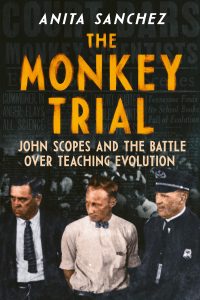 For some writers of history, the problem is finding information. But when I began to research the Scopes trial (which has gone down in history as the Monkey Trial) I soon discovered that there was no lack of information—I was buried in it. The trial was covered by more than two hundred reporters, who collectively wrote more than two million words about the trial, the town, and the people in it. Every minute of the trial from the opening prayer to the final bang of the judge’s gavel was recorded by the court stenographer, and preserved in a book that’s about three inches thick. And hundreds of photographs and moving pictures were taken in Dayton every day during the spring and summer of 1925.
For some writers of history, the problem is finding information. But when I began to research the Scopes trial (which has gone down in history as the Monkey Trial) I soon discovered that there was no lack of information—I was buried in it. The trial was covered by more than two hundred reporters, who collectively wrote more than two million words about the trial, the town, and the people in it. Every minute of the trial from the opening prayer to the final bang of the judge’s gavel was recorded by the court stenographer, and preserved in a book that’s about three inches thick. And hundreds of photographs and moving pictures were taken in Dayton every day during the spring and summer of 1925.
My problem was to bring all this mass of material to life. I wanted to turn the black-and-white images into a world of color and movement. I hoped to make those printed words come alive with the voices that shouted them. My goal was to try to recreate what Dayton looked like, sounded like, and even smelled like during that hot July so long ago.
To make any story vivid interesting, a writer has to get inside the minds of the characters. In deciding how to present this tale, I wondered who the main character should be. Clarence Darrow? William Jennings Bryan? Howard Morgan? I finally found my hero in a teacher: John Scopes, a quiet person who hated the thought of notoriety but was willing to stand up for what he thought was right.
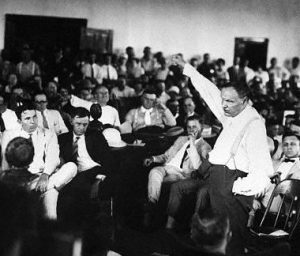
Clarence Darrow fought for the rights of students to read about science.
I wasn’t writing fiction, so I couldn’t make up people’s words and emotions. All the dialog in quotation marks is taken word- for- word from the trial transcript, newspapers, or other writings. All the emotions were described by the people who felt them. For example, I was able to write that John felt nervous when he entered the courtroom, because he wrote in his memoirs that he felt nervous when entering the courtroom. Fortunately for me, John Scopes wrote a wonderful autobiography which that preserves the flavor of the times, right down to the delicious sodas in Doc Robinson’s drug storedrugstore.
In fiction, there is often a hero and a villain. But in real life it’s rarely that simple. I was astonished to find that William Jennings Bryan, with whom I disagreed on evolution, was a huge supporter of a cause very dear to my heart: women’s rights. And while H. L. Mencken’s jokes made me chuckle, I found myself becoming outraged over his constant insulting of people who disagreed with him as “morons” and “yokels.” That’s no way to change people’s minds.
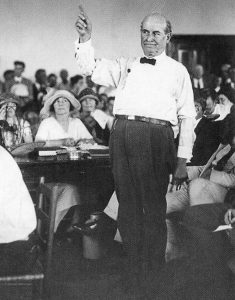
William Jennings Bryan led the movement to ban Darwin from the classroom.
Oddly enough, I finished writing this book during another long, hot, tense July: 2020, the summer of Covid-19. As I watched news reports of millions of people refusing to listen to the evidence put forth by scientists, I knew that the Monkey Trial was far from over.
The best journalists in that stifling courtroom tried to present the facts, reporting accurately what both sides had to say. So I have tried to do that—to tell both sides as fairly and honestly as I could. In the end, I agree with Dudley Field Malone that the young people of this country are pretty smart. And perfectly capable of making up their own minds what they believe.
To learn more about the battle over evolutionin the classrooom, please check out The Monkey Trial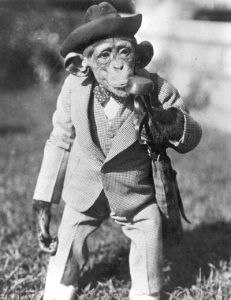
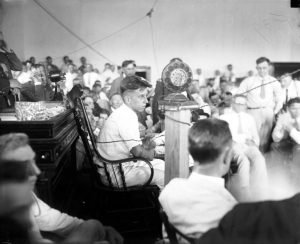
Fourteen-year-old Howard Morgan testified that his teacher was guilty of the crime of teaching evolution.





Recent Comments